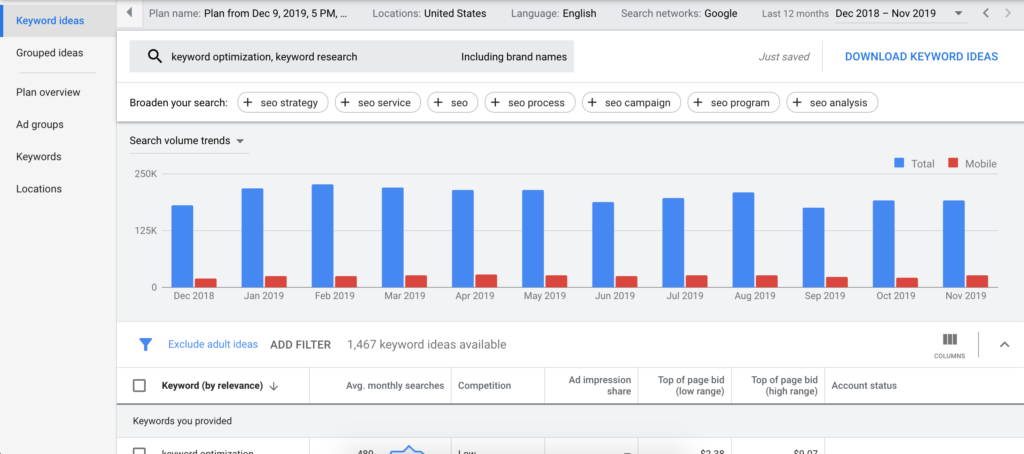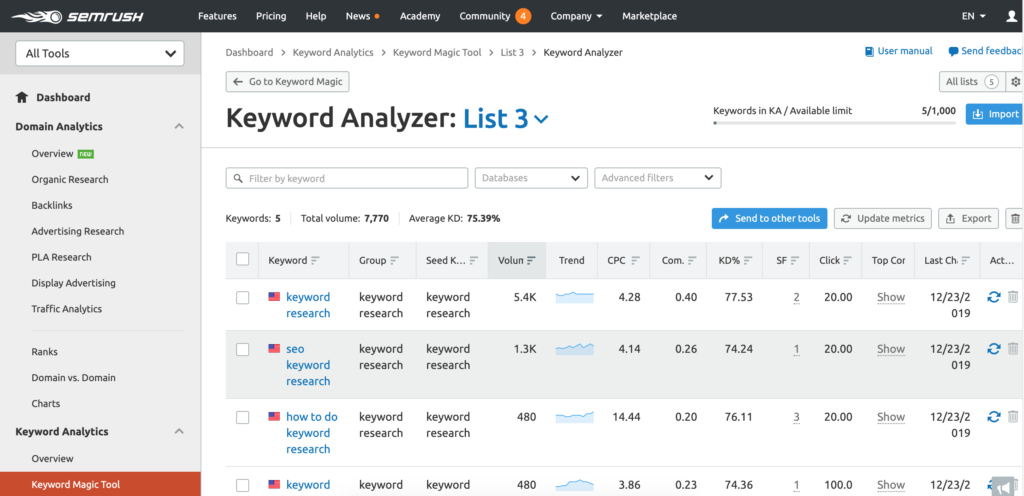Keyword Research
What Is Keyword Research?
Most people ask, “How to do keyword research” but first you must understand what is keyword research. In-short, keyword research is the act of identifying attainable keywords to target based on the available data. Keyword research is essential to starting any SEO or PPC marketing solution. If you don’t already know, advertising platforms and search engines utilizes users search queries (keywords) to match them up with URL results. The way the keywords match the content on a page determines how well that specific URL displays to users and the likelihood of attracting clicks. When keyword research is taking place, past data, current data, and future data predictions are used to make keyword targeting decisions. A quick tip of advice, we recommend spending your time researching keywords that your domain can realistically rank for in SEO solutions, in PPC solutions it doesn’t matter as much. Nationwide SEO keyword research projects that have established competitors will be very difficult to rank for certain keywords. Example, a start-up insurance company trying to rank for popular keywords like “insurance”, “health insurance”, or “personal insurance” will almost never appear in a position to gain clicks. Over time and if the business is successful, that once start-up insurance company can go after those keywords but at first they’ll have to find ways to dominate through easier keywords or phrases to rank for.
Why Keyword Research Is Important?
No one can predict the future with 100% accuracy but when we take the time to use available data, as marketers we can put our clients in a better position to get the results that we’re looking for. Keyword research is one tool that we use to accelerate the process of building successful keyword based marketing solutions. With SEO projects, knowing the right keywords to target and build content around improves key baseline metrics (clicks, impressions, CTR, avg. position). As we mentioned above, targeting attainable keywords gives a domain the opportunity to attract high quality web traffic to optimized landing pages. Take a blog we’ve helped as an example. Watch blog WristAdvisor.com is a relatively new blog but ranks very well for popular keywords because they’ve strategized which keywords to use and how to build content around them. With PPC projects the importance is much different and also much more impactful to ROI. Marketing platforms such as Google’s rewards ads that are optimized to users search queries. As a reminder, keywords are bid on within the Google Ads platform and that bid often determines the position of the ad compared to competitors. What most people don’t know is that not always is the highest bidder in the highest ad position in search results. If ads are optimized for specific keywords and landing pages are optimized for that keyword as well, Google will reward better performing ads and allow them to rank ahead of competitors even though the optimized ad has a smaller bid than its competitors.
The Difficulty Of Keyword Research
Not every keyword research project is the same and most often differ in their complexity. Like everything in life, the more experience one has and the strength of their tools can make everything easier over time. With that being said there is a difference between keyword research projects that differ in industry, size, competition and location.
Industry
No two industries are the same and potential customers search and interact within those industries vary differently. To understand search queries, one needs to understand the consumer. Obviously it’s clear industries that are more complex or larger will require a certain level of keyword research expertise to successfully identify the right attainable keywords.
Size
The size of the SEO or PPC marketing project makes a huge difference. Large scale marketing projects with a large number of keywords and similar keywords optimized for different URLs takes extra time, effort, and experience to prevent keyword overlap and other factors needed for success. The foresight to planning projects shouldn’t be lost in the process. Having a strategy (complex or simple) needs to be in place to improve quality keyword rich content throughout the life of these projects.
Competition
You can’t ignore the elephant in the room when doing keyword research, COMPETITION. Either SEO keyword research or PPC keyword research is dictated by national or local competitors in that space. Metrics such as “keyword difficulty” and “competitive density” give marketers a strong indication of which keywords are likely to rank compared to the competition.
Location (National or Local)
The scope of the SEO keyword research of PPC keyword research efforts determines how many competitors and the difficulty it takes to improve rankings. Local keyword research projects are obviously less complex and time consuming than national ones.
Free Keyword Research Tools (and paid)
In this article we’ll list some of the best free keyword research tools and a few paid ones too. It just so happens to be that most of the free tools available to use as a keyword planner involve the Google suite of tools. If you’re interested in more specifically what are the 10 Best SEO Tools please check out our other article.
Google Keyword Planner:
The Google keyword planner is a tool inside of Google Ads, the advertising platform that is used to advertise on Google and their display partners. This amazing keyword planning tool allows users to find related keywords, recommended keywords based on URL content, avg. monthly search volume, CPC bidding ranges, projected clicks, and much more. It makes sense that if your SEO or PPC strategy involves Google, it’s best to use their own data to plan your keyword strategy. This data is considered to be the most accurate and should be included in any part of the keyword research process.
Google Trends:
Google Trends is a tool that gives insight into live time searches that picks up on search trends all over the world. These trends can be broken down into subgroups and related groups. Google Trends is a great resource if your website is active and it’s goal is to provide regular up to date content to its readers or if a website is selling flash products. To all you Amazon sellers, a good product planning strategy is to perform cross platform research to compare data between both Amazon and Google.
Google Analytics:
Past data on a domain is a valuable resource. Google Analytics provides key insights into how users who used certain keywords to find a domain interact with a website. To name a few, this data can show how these individual users navigated, purchased, viewed specific pages, and made contact through the website. After analyzing the keyword usage through different channels, a marketer can make real word decisions on which type of keywords or phrases produce results so you can plan new ones in the future.
Google Search:
Google Search is the easiest of all the keyword research planning tools. It’s simple, go to Google and search for your product or service with a real world search query you’d use to find your product. From there identify where you place and how does it look. Would you click on your link? Is your ad copy compelling? Do you show up on the first page? All of these things are important to digest. More advanced research with this tool involves analyzing your competition and back engineering their successful strategies. How do their links read? Can you identify the keywords their targeting? What can you copy into your strategy that they do correctly? This should be one of the first stages in your keyword planning process because you’ll get an idea of what the competition is doing and how they are having success.
SEMrush (Paid):
If you’re looking for a great resource that can pull data from all over the internet, SEMrush is one of your best options to improve your SEO keyword research and PPC. SEMrush will give you access to competitor website analytics, keyword usage, their active (and lost) backlinks, and more competitive information. On top of that they have their own keyword planner tool that provides accurate and useful data to make keyword targeting decisions. Like all software programs, your experience and knowledge of the platform heightens the success of using the platform. It’s easy for the DIY crew to get lost in all the different tools SEMrush offers. That is why we suggest even if you’re doing the marketing in-house, it’s always a good idea to outsource keyword research and targeting because it’s the foundation of the projections that time and money will be invested into. If you’re interested in subscribing to the SEMrush platform, at the time of the posting of this article, the current SEMrush monthly subscription for a single user is $99/month.
What To Evaluate While Researching Keywords
There are many factors that need to be evaluated when researching which keywords need to be targeted for seo or ppc marketing solutions. We classify these factors in two groups which are pre-project and post-project.
Pre-project:
Are the keywords targeted realistic and attainable?
Understand how competitive certain keywords are and the realistic possibility of ranking for those keywords with your current digital assets. Spend your time producing results and that sometimes means getting creative with different keywords or longer keyword phrases.
How specific should a keyword phrases be to target?
Is your product a niche or can it easily be searched in broad terms? Do I need longer keyword phrases to compete in popular searches? These are the types of questions you’ll need to ask yourself when determining the length of your keyword phrases to target. Typically the longer the keyword phrase, the less competitive it is but it also receives less impressions.
Do these keywords have enough impressions to produce the desired amount of projected clicks?
Your keyword research will give insight into historical search metrics for impressions. Don’t spin your wheels and optimize your content for search terms that are hardly searched. Make sure that your keyword rich strategy will provide enough exposure that you’ll be able to attract the number of clicks your website needs to drive value. Keep in mind, it’s not always the best idea to target the keywords with the most impressions. Targeting the right keywords is a highly complicated decision that adequate impressions plays a large role for.
Are the keywords you’re targeting common language your potential customers will use?
Target keywords that are phrases in ways that users will actually use for their searches. Optimizing for keyword phrases that don’t make sense or aren’t relevant produce lackluster results.
Post-project
Which metrics will need to be evaluated to determine success?
This is where marketing experience plays a large role. Understanding average benchmarks can help with the keyword research process. After knowing the strategy, marketing pro’s will identify KPIs (key performance indicators) to monitor that will determine success. These metrics can be monitored in Google Analytics, Google Ads, and Google Search Console depending on if the project is SEO or PPC based.
Which conversions will be tracked?
Understand what are the valuable events/actions that users make on a website that drive real life value. These actions are important to track because they are considered the finish line. Good marketing pro’s have the ability to back engineer converted users path and incremental actions that will help with future optimization to produce higher conversion rates.
What is your scheduled optimized schedule?
Useful data doesn’t happen overnight. It takes time to compile enough data that can be used for optimization efforts. Unfortunately it is hard for some companies to stick to the optimization plan or review data from a longer outlook lens. We recommend that our clients don’t fall within those downfalls because it’ll make future decision making much harder. We recommend optimization schedules of 45, 60, or 90 days that include an annual review.
Does your content allow for future segmentation?
Great website content strategies allow for segmentation and further breakdowns of available content. What we mean by future segmentation is if can you create subtopics of the main topic of a page. An example from our industry is a page about digital marketing. Once we have successfully targeted the correct keywords and are having success we can further segment and create more valuable content for our readers. This will improve the user experience, SEO, and give me opportunities for landing pages once ad groups segment themselves as well. Evaluating your keywords through this lense is especially important for SEO keyword research.
How To Use Negative Keywords & Exclusions
In most cases, using negative keywords or exclusions is the most effective tools to appear in relevant search results during campaign launches. It’s difficult to know exactly what users will type in their searches for your product but it’s easy to know which searches that you don’t want to appear in. A great example is a PPC advertising campaign for wrist watches. The keyword “watch” can be effective used in the right situation. Unfortunately that keyword will also populate ads for the search term “how to watch movies on youtube”. To prevent appearing in searches that aren’t related to your product or service, marketers create large negative keyword lists and exclusions. In this example if the marketing team had a negative keyword list that had either the keyword “movie” or “youtube” they would have never appeared in this search results which leads to an improvement in wasted ad spend.
Results Of Successful Keyword Research Planning
- Improved results from the initial launch
- Quicker SEO keyword optimization
- Quicker PPC keyword optimization
- Less wasted ad spend
- Rank higher in search results
- Out maneuver the competition
Keyword Optimization
What is Keyword Optimization?
Keyword optimization is the process of measuring past data and using that data to make incremental changes to strategy and keyword content. Before launching campaigns/ projects, KPIs should have already been established with benchmark goals. Predefining results in digital marketing is difficult because there are many variables to account for and ever changing algorithmic changes to how search results operate. Our digital marketing agency sets a standard baseline of KPI goals based on industry benchmarks and seeks to outperform those during our first round of optimization. It is our view that keyword optimization is not a one time occurrence. Keyword optimization is an on-going process that is performed with the end goal of outranking the competition. Our team always asks themselves, “How can we improve the content to rank better for our targeted keyword.” In most cases the answer is different for each keyword optimization effort. Our experience in SEO keyword optimization and PPC keyword optimization gives us the ability to analyze any situation to always find quick wins and ways to improve on the content strategy.
What Key Performance Indicators Can Be Measured
Conversions
Conversions are final events that produce real-world value in revenue for businesses. Most often conversions are the first metric that is measured for keyword optimization.
Clicks
Clicks measure how many visitors either ppc or SEO links were clicked.
Impressions
This metric records how many searched results a link appeared in. During the SEO keyword optimization process, impressions are typically the first result that takes off and gives a project manager insight into how initial keywords are performing in search results.
Impression Share
Impression share compares how your links compete against competitors and the overall number of searches. While evaluating this metric in keyword optimization, take not to historical rankings so you can compare if you’re gaining ground on competitors.
Click Through Rate
CTR is the rate of which links are clicked. The calculation for CTR is CLICKS/IMPRESSIONS. This is a good indicator of how effective the ad copy or metadata is for the landing page links.
Top of Page Rate
This metric is available only for PPC campaigns. This is the rate at which your ads display in the first 3 positions in a search result.
Bounce Rate
Knowing how users interact with your website is important. Bounce rate measures how often a users visits a second page while on a website.
Avg. Session Duration
How engaged are users with your content? Avg. session duration gives insight into how long a user is on a page which can be a good indicator if your content is being consumed or skipped over.
Avg. Position
This metric used to be available for PPC campaigns but it’s now only viewable for SEO data. Avg position measures the position that a link displays for given search terms. This can be used to evaluate which keywords are ranking well, or not so well, for website content.
New vs. Returning Visit
How often are users coming back to a website? This KPI will evaluate the spread and if certain initial keywords are attracting the right traffic, because if they are those visitors are most likely to return. Optimize your keywords to attract the most valuable traffic that is most likely to engage with your content multiple times.
Pages Per Session
This KPI is simple but yet one of the best indicators if your keywords are optimized. Pages per session give insight into how many pages, on average, users are viewing per session. If the content users are consumers is rich and original, they are most likely to engage with it more.
How To Start Keyword Optimization
To begin keyword optimization you’ll first need to define your schedule and process. Your schedule determines how often you’ll evaluate for keyword optimization and the process will be how you actually evaluate and make changes. The keyword optimization process typically is conducted in intervals of 30, 60, and 90 days. The process usually begins with evaluating overall keyword KPIs to past data, current data, and projected goals. Once you have a good understanding of how the overall program is producing results, it’s time to dive in deeper and start taking a look at specific keywords for optimizing. When looking at the overall data you should identify changes that will give you an initial keyword evaluation path, those are the keywords to evaluate first. Now that it’s time to begin specific keyword optimization you’ll want to continue what you did in the previous step, evaluate KPIs to past, current, and goal data. Finally it’s time to testing and implementation. Through analysis you should have identified areas to make necessary adjustments to the keywords to improve results. Document you changes and wait until the next interval to measure success. This should be a continuous process because SEO and PPC keyword competition is an ever-changing environment that should always be monitored.
For a list of optimization tools read our article 10 Best SEO Tools For Keyword Optimization.
Quick Keyword Optimization Wins
There are a couple quick things to look at if you’re conducting keyword optimization. We’ll list a couple here.
Similar keywords (not used)
If you notice that a URL is ranking for a keyword or phrase that’s similar to the one you’re targeting that’s having success, optimize for that one too! You’ve been unintentionally have success so why not enhance results for that keyword?
New landing pages for cannibalized keywords
It’s never a bad idea to let certain keywords have some breathing space and creating new pages for them is a great way to do that. This increases the content of a domain and further segments keywords and specific content that should provide a better user experience.
Insert new successful keywords in metadata
Changing up your keyword metadata is always a good idea if you’re not hitting your goal CTR or if you’re not ranking as well as you should. Lot’s of weight is put into metadata and switching it up can be a huge benefit to quick wins with keyword optimization.
Increase keyword density (where it makes sense)
If it’s not clear what your targeted keywords are after reading your content for a second time, it’s probably time to increase keyword density where it makes sense. When doing keyword optimization you don’t want to engage in shady SEO behavior. Please remember that content should be naturally and flow like users will expect.
How To Evaluate Competitive Metrics For Keyword Optimization
What your competitors are doing matters. That means that you need to incorporate competitive analysis into your keyword optimization process. We’ll highlight some quick actions you can take to evaluate your competitors keyword optimization.
Performing test searches
Go to Google and type in keywords and evaluate how your competitors appear compared to your domain. There is a lot you can learn from this.
Access competitive data
Google Ads and SEMrush both have great competitive research tools that can be used to get competitive data that can be used to improve your keyword optimization.
Evaluate their content
Go to your competitors website and digest their content. See what they are having success with, identify their target keywords, and get some good ideas from this process.
Benefits of Keyword Optimization
- Lower bids can outrank competitors
- Increase targeted traffic
- Improve rankings on search engines
- Increase organic (free) web traffic







